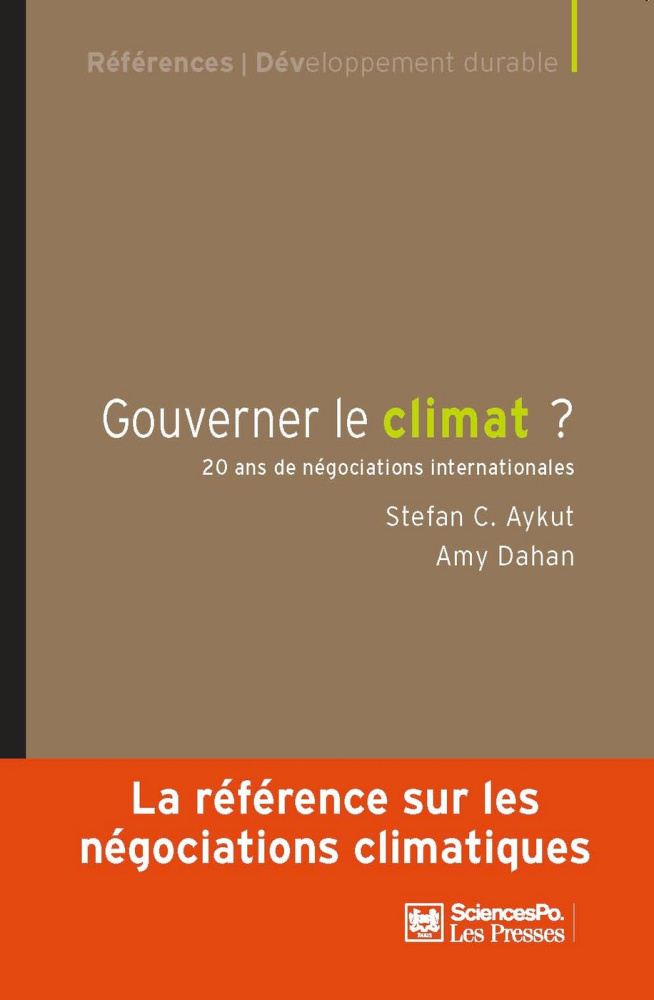Gouverner le climat ?
20 ans de négociations internationales
First Edition
During the past twenty years, the problem of climate change has moved to the top of the global agenda, and a multilateral process has been implemented to address it. Nevertheless, greenhouse gas concentrations in the atmosphere reached record levels in 2013.
How, therefore, should we view the outcome of international negotiations? Reviewing the political treatment of climate change, from the Kyoto Protocol to today, the authors of this volume analyse the stakes at play and as well as the current form of governance, which has engendered as many expectations as it has disappointments. Is it possible to shift paradigms while the world is experiencing rapid transformations and confronting multiple crises? How should the issue of climate change be addressed with regard to the future?
Serving as a reference point on climate change and related strategical questions, this work examines the relationship between science, politics and the role of experts; the evolving geopolitics of climate; energy transition in Europe, the United States and major emerging countries; and the multiple links between climate change and globalisation, and between adaptation and development.
Specifications
- Publisher
- Presses de Sciences Po
- Author
- Stefan Aykut, Amy Dahan,
- Collection
- Références
- Language
- French
- Tags
- , , , , Sustainable development
- Publisher Category
- > Geopolitics > Gouvernance mondiale
- Publisher Category
- > Geopolitics > Sustainable Development
- Publisher Category
- > Fields > Sustainable development
- Publisher Category
- > Environment
- Publisher Category
- > Geopolitics
- Publisher Category
- > International field
- BISAC Subject Heading
- POL000000 POLITICAL SCIENCE > REF000000 REFERENCE
- BIC subject category (UK)
- H Humanities
- Onix Audience Codes
- 06 Professional and scholarly
- CLIL (Version 2013-2019)
- 3283 SCIENCES POLITIQUES
- Credit
- Presses de Sciences Po
- Title First Published
- 15 January 2015
- Subject Scheme Identifier Code
- Thema subject category: Politics and government
Thema subject category: Encyclopaedias and reference works
- Type of Work
- Monograph
- Includes
- Index, Bibliography
Paperback
- Publication Date
- 15 January 2015
- ISBN-13
- 978-2-7246-1680-4
- Product Content
- Text (eye-readable)
- Extent
- Main content page count : 752
- Code
- 9782724616804
- Dimensions
- 12.5 x 19 x 3 cm
- Weight
- 710 grams
- ONIX XML
- Version 2.1, Version 3
ePub
- Publication Date
- 01 March 2015
- ISBN-13
- 978-2-7246-1682-8
- Product Content
- Text (eye-readable)
- Extent
- Main content page count : 752
- Code
- 9782724616828
- Technical Protection ebook
- Adobe DRM
- List Price
- 16.99 €
- ONIX XML
- Version 2.1, Version 3
Google Book Preview
Contents
Introduction
Chapitre 1 / UN PROBLÈME SCIENTIFIQUE, POLITIQUE ET DE CIVILISATION
L'alerte scientifique
La mise en place du processus onusien de gouvernance climatique
Un globalisme problématique
Le changement climatique au cœur de la préoccupation environnementale globale
Chapitre 2 / LE RÉGIME CLIMATIQUE ONUSIEN
EXPERTISE, GOUVERNANCE, ARÈNES
Les trois piliers du régime climatique
La mise en place d'un processus d'expertise global : GIEC et SBSTA
Les scénarios du changement climatique et la question des futurs
La gouvernance onusienne
Le off des COP, poumon du processus
Chapitre 3 / LE PROTOCOLE DE KYOTO ET LA GRAMMAIRE DU MARCHÉ
Les failles d’un protocole « contraignant », mais « flexible »
Comment les quotas se sont-ils imposés ?
Le retrait des États-Unis
Les marchés de permis négociables, un instrument controversé
L’avènement d’une grammaire du marché
Chapitre 4 / ÉTATS-UNIS
UNE DÉFECTION LOURDE DE CONSÉQUENCES
Les origines américaines de l’alerte environnementale et climatique
Une participation hésitante à la construction du régime onusien
Une guerre idéologique sur le climat
La question énergétique en arrière-plan
Des raisons d’espérer ?
Chapitre 5 / L'EUROPE ET LE CLIMAT
UNE LONGUE HISTOIRE PARTAGÉE
L’arrière-plan énergétique d’une ambition de leadership
L’échec de l’approche top-down des politiques climatiques européennes
Une « Europe modèle », sans politique climatique commune
Vers une approche très libérale des politiques climatiques
Le climat dans la construction européenne
Chapitre 6 / LA NOUVELLE GÉOPOLITIQUE DU CLIMAT
PAYS EN DÉVELOPPEMENT, PUISSANCES ÉMERGENTES
La lente montée en puissance du thème de l’adaptation
La Chine, mastodonte dans la mondialisation, et le régime climatique
Le Brésil, une grande puissance verte ?
L’équité, un enjeu majeur des négociations
Chapitre 7 / LE CHOC DE COPENHAGUE
LA RÉGRESSION DU CLIMAT
La conférence de Copenhague : un échec non contingent
L’objectif des 2°C : une coproduction entre expertise et politique
Un laboratoire de la société globale
Les sursauts du multilatéralisme et la routine onusienne
Le sommet de Rio 2012 et le fiasco de l’économie verte
Chapitre 8 / UN SCHISME AVEC LE RÉEL
La constitution du schisme
Les grandes accélérations du monde
Le paradoxe du diagnostic scientifique, entre vérité et irréalisme
Les impasses du cadrage de la gouvernance
Chapitre 9 / POUR UN AUTRE ORDRE DE GOUVERNEMENTALITÉ
Quelques propositions pour changer de régime climatique
Pour une « nouvelle économie de l’effet de serre »
Mettre les questions d’énergie au centre des débats
Repenser le développement
Une réforme inéluctable des règles du commerce mondial
Chapitre 10 / EUROPE, ALLEMAGNE, FRANCE
ENTRE CRISES ET IMPÉRATIFS DE TRANSITION
Europe : face au risque d’éclatement, la nécessité d’un projet commun
Le tournant énergétique allemand : un modèle à suivre ?
Où en est la transition énergétique française ?
La route difficile vers une Europe de l’énergie
Chapitre 11 / FUTURS. LE CHAMP DES POSSIBLES
Le diagnostic de l’Anthropocène
Les récits de la catastrophe
Les premières réponses scientifiques et politiques à l’Anthropocène
La géo-ingénierie planétaire : la technique à la rescousse
Une « grande transformation » ? Entre volontarisme, pragmatisme et retournement
Paris 2015, une étape vers quoi ?

